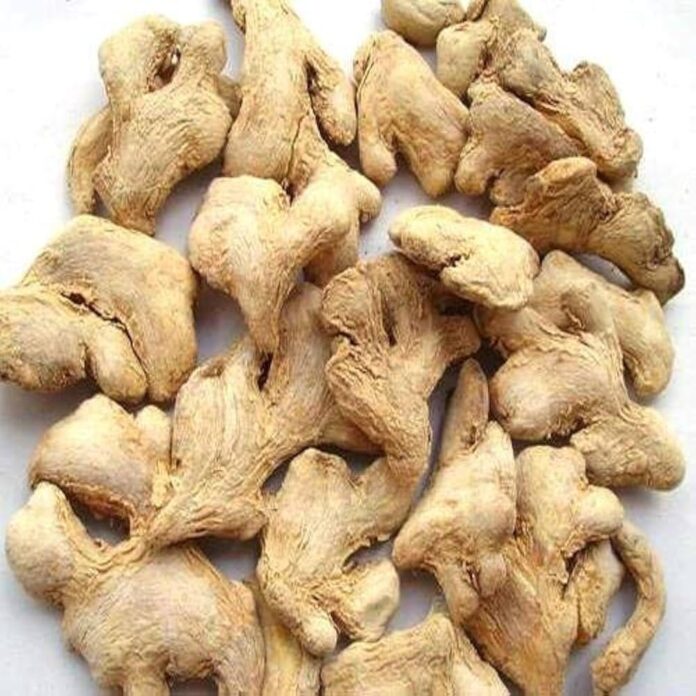Introduction

Dried ginger, also known as Sonth or Saunth in Hindi, is an essential spice used widely in Indian cooking and traditional medicine. Derived from fresh ginger root, it is typically dried and ground into a powder or sometimes consumed in its whole form. Its warming and pungent flavor makes it an integral part of many culinary and medicinal practices. This article explores the various forms of dried ginger, its health benefits, and possible side effects.
Forms of Dried Ginger (Sonth, Saunth)
- Whole Dried Ginger
This is the whole, dried form of the ginger root, often used in herbal preparations or as a whole ingredient in cooking. - Dried Ginger Powder
The most commonly used form of Sonth, this is simply dried ginger that has been ground into a fine powder. It is versatile and can be added to curries, teas, and even smoothies. - Sonth Churna (Powdered Form in Combination)
A blend of dried ginger powder mixed with other Ayurvedic herbs like black pepper, cumin, or turmeric, used to enhance digestion and balance the body’s doshas in Ayurveda. - Sonth in Capsules or Tablets
In modern times, dried ginger is also available in convenient supplement forms like capsules or tablets, often taken for specific health conditions. - Ginger Extracts
Concentrated liquid forms of dried ginger are available and are often used in tinctures, teas, or herbal medicines.
Health Benefits of Dried Ginger (Sonth, Saunth)
- Digestive Health
Sonth is well-known for its ability to aid digestion and soothe the digestive system. It helps in the production of digestive enzymes, promoting better absorption of nutrients. It can alleviate common digestive issues such as bloating, indigestion, constipation, and nausea. Ginger’s carminative properties make it an excellent remedy for gas and flatulence.
- Anti-inflammatory Properties
Dried ginger contains bioactive compounds such as gingerol, which exhibit potent anti-inflammatory and antioxidant effects. This makes it useful for relieving inflammation in conditions such as arthritis or muscle soreness. Studies have shown that ginger can help reduce pain and swelling in joints, making it an alternative remedy for conditions like osteoarthritis and rheumatoid arthritis.
- Relieves Nausea and Vomiting
One of the most widely recognized uses of ginger is in alleviating nausea, whether it’s due to pregnancy (morning sickness), motion sickness, or chemotherapy treatments. Consuming dried ginger in powdered form or in tea can provide significant relief from nausea and vomiting.
- Respiratory Health
Ginger has natural expectorant properties, helping to break down mucus and phlegm in the respiratory tract. This makes it beneficial for treating colds, coughs, and respiratory infections. It can also help soothe a sore throat and ease coughing.
- Boosts Immune Function
Ginger’s antioxidant properties support a strong immune system, helping the body to fight off infections and diseases. It is often included in remedies for the common cold or flu to enhance recovery.
- Improves Circulation and Heart Health
Dried ginger is said to improve blood circulation, which in turn helps lower the risk of cardiovascular diseases. It can help in reducing blood pressure and cholesterol levels. It is also believed to support heart health by improving blood flow and reducing the formation of blood clots.
- Weight Loss
Some studies suggest that ginger may assist in weight loss by increasing metabolism and promoting fat-burning processes in the body. It may also help curb appetite and reduce feelings of hunger, making it easier to control calorie intake.
Side Effects of Dried Ginger (Sonth, Saunth)
While dried ginger has numerous health benefits, excessive consumption can lead to side effects in some people. It is important to be aware of these potential risks and use ginger in moderation.
- Gastrointestinal Issues
Consuming large amounts of dried ginger may cause gastrointestinal irritation, including symptoms like heartburn, stomach upset, or diarrhea. People with sensitive stomachs or acid reflux should be cautious when using ginger.
- Allergic Reactions
Although rare, some individuals may experience allergic reactions to ginger, including skin irritation, rash, or itching. If you experience any allergic symptoms, it is important to discontinue use and consult a healthcare provider.
- Bleeding Risk
Ginger can act as a natural blood thinner, so it may increase the risk of bleeding, especially when taken in large amounts or combined with blood-thinning medications like aspirin or warfarin. People with bleeding disorders or those undergoing surgery should avoid excessive ginger consumption.
- Interaction with Medications
Dried ginger can interact with certain medications, especially those that affect blood sugar levels or blood pressure. Individuals taking medication for diabetes, high blood pressure, or heart conditions should consult their healthcare provider before using ginger as a supplement.
- Pregnancy Concerns
While ginger is generally considered safe during pregnancy when consumed in moderation, large doses should be avoided, as they may lead to adverse effects, such as contractions or uterine stimulation. Pregnant women should consult their doctor before using ginger for medicinal purposes.
This Article is for Basic Information. Contact a professional doctor before using it.
HAKEEM KARAMAT ULLAH
+923090560000




